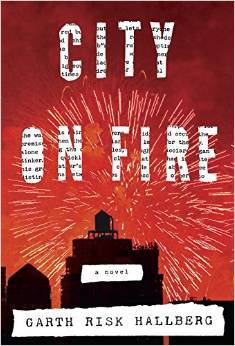
City on Fire: a long, slow burn
This review originally appeared in The Memphis Flyer.
“Are you trying to set a record for the longest time to read a book?” My wife asked me this question one night recently as I turned to page 745.
I began reading City on Fire (Knopf) by Garth Risk Hallberg when it first came out. That was back in October of last year, and I’ve only just finished. I’m a notoriously slow reader, and this tome is 944 pages. Still, I should have finished it earlier. Why didn’t I? Things got in the way: Work. Kids. I clicked around on Facebook, made a tweet or two. I binge-watched House of Cards andDaredevil. We started and finished every season of Black Sails in the time it’s taken me to read this book.
These are the things that go into making us who we are, the DNA of our personalities. Okay, maybe not marathon viewings of Netflix, but certainly real-life interactions and the discussion of television over beers at a local taproom.
Just as these are the ingredients that go into making us the gumbo of who we are, writers cobble such details together to create characters and plot lines. Many times, reams of paper are used, flash drives filled, whole novellas written in creating the backstory for characters. Most of the time, these are pages for a drawer or the trash. But sometimes all of that backstory makes it into print — necessary for the reader’s understanding or not — to flesh out a 944-page novel.
A long book isn’t necessarily a bad thing, unless the story drowns in the undulating waves of exposition, digression, and flashback, and I’m afraid that’s what’s happened with City on Fire. Hallberg is a gifted writer and builds a dramatic and detailed backdrop of 1970s New York, which unfortunately loses its focus as the action drags. In the final section, there is a sense of urgency that propels us toward the climax, but it feels like an afterthought to all that’s come before.
The storylines in Hallberg’s debut novel are compelling. The characters are fully formed. The voice is strong. The gumbo is delicious. My issue is with the editor who left the directions for the sausage-making right there on the wrapper for us all to see — every character’s backstory, every sub-subplot’s arc.
But perhaps it’s not solely a problem of editing. It’s the same issue I ran into with The Goldfinch (Little, Brown). Donna Tart’s 773-page novel had a buzz, more even than City on Fire and its reported $2 million advance for Hallberg (did I mention this is his first novel?), and I read both books expectantly, the way my kids eagerly anticipate a vacation to the beach. What they don’t anticipate is the long, seemingly endless road trip it takes to get to that destination. Indeed, the reading of Goldfinch and City both elicited more than one “How much longer?” and “Are we almost there?” from me.
More than editing, though, I think it’s a problem with publishing. Every so often one of the big five houses, in a snit over the media’s fascination for Amazon’s attempts to conquer their world, feels the need to say, “Look at us! We’re still relevant! Look what we can do!” And in those moments, they woo agents and they create bidding wars and they manufacture hype for a novel the size of a toaster oven and a writer yet to prove his worth. That novel becomes the binge-watching of the publishing world.
But then again, I’m probably just bitter. Because in the months it took me to read City on Fire, along with work and television, I also finished writing my own novel. That 243-page manuscript is currently treading in the query-and-rejection pool of publication. So if publishers can pay $2 million for a book, then good for them. And good for us, too, because we need more compelling stories, well-formed characters, and strong voices such that City on Fire and The Goldfinch offer, regardless of the road it takes to get there.
Once I (finally) finished City on Fire, I had to give this book, which had lived on my nightstand for so long, a home. To do so, I displaced much slimmer volumes of Camus, Morrison, and Fitzgerald. Is it worthy? Does its heft make it a better book than these? I’m afraid it’s not even in their weight class.
